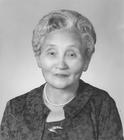Minidoka
Brick #1373 Wall Location Column: 49 Row: 12
Chiyono Yamagami was born on Feb. 28, 1895 to Chiyokitsu and Hide (Nakayama) Yamagami. She had an older sister (Iwa Katayama), two older brothers (Katsuta Yamagami, Denkichi Noda), and a younger brother (Shintaro Nishizaki). They lived in Okayama prefecture. Chiyono came to the U.S. on Aug. 2, 1913 at the age of 18 with her boat landing in Tacoma, Washington. She spoke no English, but she knew her husband-to-be, Teisaku Katayama, before arriving in the U.S. They married on Aug. 22, 1913 in Tacoma.
About the same time as Chiyono arrived, Teisaku started a dairy farm in Enumclaw and sold milk. Beginning with 3-4 cows, the farm eventually grew to 100 cows. Chiyono would milk the cows by hand even when pregnant and carrying a child on her back.
She gave birth to her first child in 1914. Eventually, the Katayamas would have nine children: Yoneko, Tad (Tadashi), Yo (Yoshiko), Sid (Sadao), Toy (Toyono), Sumiye, Terry (Teruo), Connie (Kaneko), and Bruce (Yeichi). Chiyono was a self-taught seamstress and she would sew all the kids’ clothes. Yoneko would also help. Teisaku would often buy the cloth on sale.
After auctioning off their farm in 1922, they moved to Seattle and Teisaku worked as a fish and Japanese food peddler. He would go to the sawmills in Selleck, Enumclaw, and Snoqualmie to sell his goods. Around 1936, Teisaku retired from fish peddling and the family started a grocery store in Seattle called Tad’s Market & Grocery on 1511 Rainer Ave. S. About this time, Chiyono started working at the Hirano Farm in South Park, Seattle. Teisaku died on Aug. 23, 1941.
On Dec. 7, 1941, Japan bombed Pearl Harbor and the U.S. entered World War II. In Feb. 1942, Chiyono and her family were ordered to leave Seattle per Executive Order 9066, signed by then President Franklin Roosevelt, to move all people of Japanese ancestry from the West Coast to internment camps. These were very trying times for Chiyono since she had a son (Sid) already serving in the U.S. Army. Taking only what one could carry, the family was forced to live in a temporary, one room facility equipped only with electricity at the Puyallup Fair Grounds, which was completely enclosed behind barbed wire fences and guarded by U.S. Military personnel. During the fall of 1942, the family was transferred to a permanent internment camp in Hunt, Idaho, called Minidoka Relocation Camp where Chiyono and her family stayed until 1943. While in camp, Chiyono learned English from Kiyoshi Sugai.
Chiyono and several of her children were finally able to return to their house in Seattle in late August 1945. The house had been maintained and lived-in by a good Caucasian friend during the war. Chiyono worked at Kunio Otani Greenhouse in Greenwood. During the early 1950’s, Chiyono worked on her English and studied U.S. history. Eventually her hard work resulted in successfully receiving her U.S. citizenship naturalization papers.
After her children all moved out, Chiyono lived alone in their large home along with her dog, Micky. A black, long-haired mutt, Micky loved the Japanese food Chiyono would feed him and he lived to a ripe old age of 18 yrs. Her children and grandchildren would visit her often in the large house. Over time, Chiyono's failing health forced her to leave the house and stay with the families of her children. When her deteriorating health required full-time care, Chiyono went to live in Keiro Nursing Home in 1980. She died on Jan. 18, 1981 at the age of 85.
Donate A Brick
Honor any Japanese American who was interned or who has served in the military by donating a brick in thier name.
Brick Donation Form
Remaining Spaces:
Internee 456 | Veteran 113
